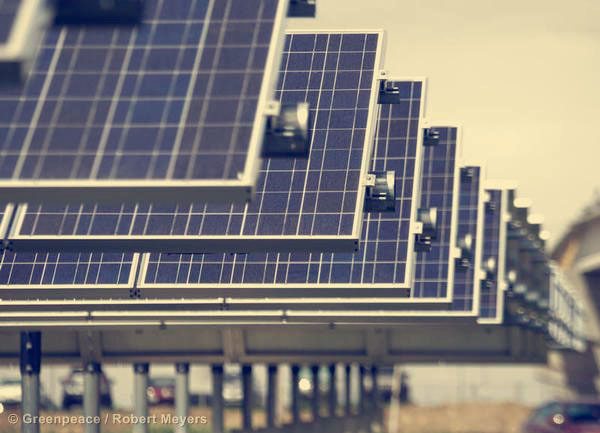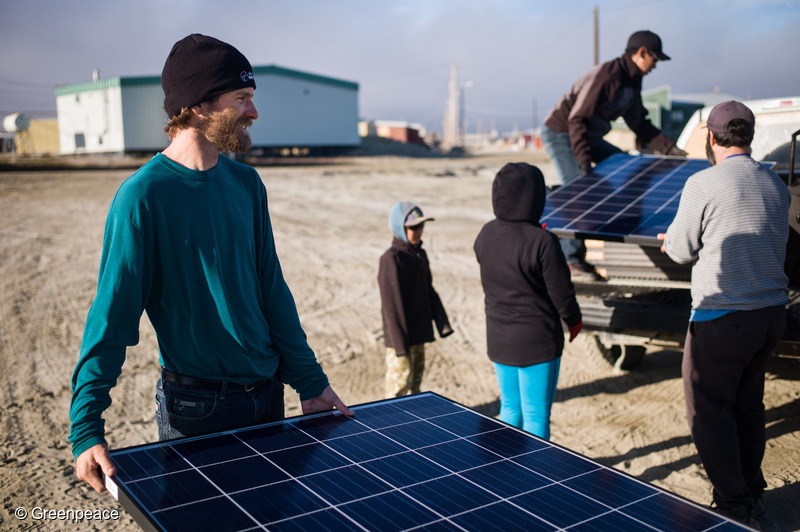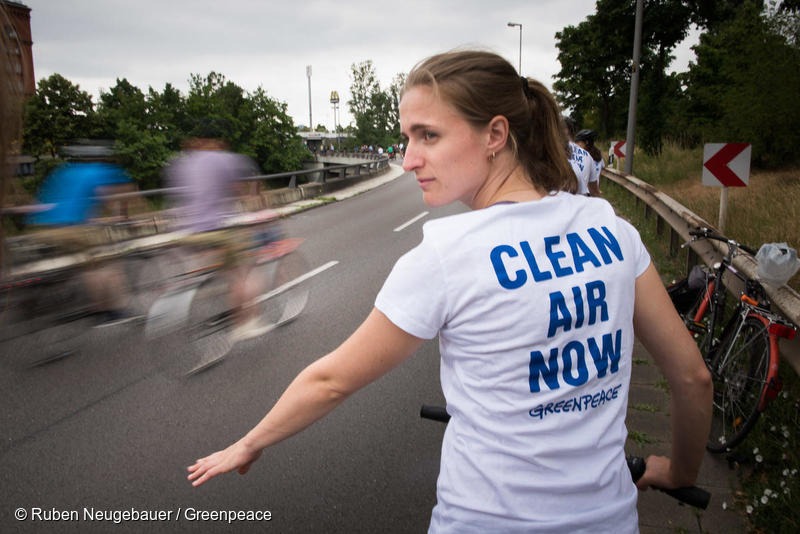NSW is lagging behind all the other states and territories in the transition to clean energy. NSW is a drought declared state, with catastrophic bushfires and extreme heat waves across the state. Regional towns are on the brink of running out of water, millions of fish are dying in the Murray Darling Basin and heatwaves are threatening lives. It’s time for action, and we have a plan.

Sternfahrt in Berlin Diese Straßen sind am Sonntag gesperrt|A man walks in solar farm.
Thailand has great potential in producing solar power. Government promotion of renewable energy supports these cleaner technologies. The Thai Government has also set a National Agenda for renewable energy, which aims for 25% of the country’s energy portfolio to come from renewable sources by 2022.
However, Thailand lacks the infrastructure that will truly support such high potential, like pushing for a ‘Renewable Energy law’ for example, that will promote policies, increase energy security in the country by reducing energy imports, increasing energy resources, building competitive energy market for sustainable economic growth, and help reduce CO2 emissions.
In the face of this climate crisis, the inadequacy of the NSW Government’s response is stark.
We need a government to act and act now.
With the NSW election fast approaching, we will be working in key swing seats such as Coogee, Monaro, Penrith, Bega, and Ballina. We will be targeting both sides of politics to make sure leaders understand that not taking climate change seriously is not an option.
What are we asking candidates and parties to do on climate?
We’ve put together a clear and achievable six point plan. Here is what we’re calling for:
- Go big on renewables. It’s simple – We need more renewables. The party that wins government in March needs to legislate and support policies which will build 4000MW of renewable energy and storage in the first term of government.
- Walk the talk. A new NSW Government should ensure all government operations – schools, trains, and hospitals – are powered with 100% renewables in the next term of government.
- Solar for all. Electricity prices and cost of living are front of mind issues for the people of NSW. A NSW Government should establish a Solar for All rebate to support renters, people who live in apartments and others to access solar.
- Smart homes. NSW homes, particularly rental properties are like leaky tents when it comes to energy efficiency. To ensure everyone has a healthy home a NSW Government should introduce minimum energy standards.
- Clean up our air. Air pollution contributes to the premature death of more than 3000 Australian’s a year, yet NSW air pollution standards lag behind Europe, USA, and China. Any NSW government in power needs to fix this by setting and enforcing credible air-quality standards.
- Emissions reduction targets. Emissions reduction targets as they stand are meaningless without legislation. The new NSW government must legislate for net-zero emissions by 2040 so all government decisions consider the impact of policies on reaching this goal.
Want to take action? Call on both parties to commit to our plan for climate action now!
And here’s a little more detail on each of the six points:
Go big on renewables:
A cohesive, integrated energy and climate policy in NSW is needed to give confidence to the private sector, advance low carbon investment and accelerate new renewable energy generation in this state. While legislated percentage targets have worked in other states and jurisdictions, infrastructure or megawattage targets are another means of providing business certainty.

The NSW Government should set a target to contract at least 4000MW of new large-scale renewable energy and storage infrastructure in NSW in the next term of government (by 2023). This should be underpinned by reverse auctions (held twice a year) to encourage technology neutral renewable energy projects, this will:
- Unlock approximately 1875 construction jobs each year1 the majority of which will
be based in regional NSW, and at least 280 ongoing jobs; and - Ensure that there is enough renewable energy capacity built in the case of coal
power plant failure. - The NSW Government should ensure all NSW Government operations are powered by 100% clean energy within the next term of government, from schools and hospitals to trains and government buildings, with priority given to new transport and infrastructure projects.
[optin-monster-shortcode id=”idhx0itzeyrdspakjsmj”]
Ensure affordable clean energy for everyone in NSW
Climate change, electricity prices and cost of living are front of mind issues for the people of NSW. While the broader energy market is going through a state of change and retail prices are in flux, providing solar, battery and efficiency rebates, low interest loans and incentives gives families, young people and renters the tools to tackle their cost of living pressures at home. It encourages individuals to help bust their electricity bills and play their part in ensuring a cleaner energy future for NSW.

NSW has a higher proportion of locked-out energy users than other states with 30% of households renting and 21% of households living in apartments. This equates to approximately 40% of NSW households (~990,000) who currently can’t put solar on their roof.
This plan includes:
- Ensuring every household locked-out from solar (including rental properties) can access it in the next decade, by introducing a Solar For All Rebate. The Solar For All Rebate should include:
- In the next term of government the NSW Government should ensure that
400,000 locked-out energy households are supported to access solar at a cost of $1.11 billion; - An extension of the existing Solar For Low Income Households Program2 to
provide full rebates for very low income households; - A half-rebate for other locked-out energy users similar in structure to the
Victorian Solar Homes program, including public and social housing providers; - Only households that either cannot afford to put solar on their roof or do not have
a suitable roof should be eligible for the Solar For All Rebate; and - Support for households to access solar on their own roof in a micro grid or
through a solar garden (offsite solar).
- In the next term of government the NSW Government should ensure that
- Setting and enforcing standards to ensure all houses are energy efficient and healthy to live in. This should focus particularly on rental properties and mandatory energy information disclosures at the time of sale and lease.
- Supporting existing solar households to get batteries through a combination of a zero-interest loan program and a series of Virtual Power Plants, similar to the South Australian Virtual Power Plan and battery initiative.
- Establishing a $100m Smart Energy Communities program. This would:
- Establish 10 clean energy hubs across the state to help community groups
investigate and implement a range of models for community energy; - Provide grants for community energy projects, and
- Provide advice to households and support farmers, local governments, social housing providers and others to implement renewables and energy efficiency programs.
- Establish 10 clean energy hubs across the state to help community groups
- We have concerns about the current Solar for Low Income Households program. Any Solar for All policy should ensure that households are better off from day one.
Double NSW’s energy productivity by 2030
NSW has historically had a good track record on energy efficiency, but much more can and must be done, including:
- Extending existing programs, including the white certificate scheme.
- Establishing a new $200 million Manufacturing Energy Efficiency Fund that supports electricity and gas intensive businesses (particularly small businesses) to become more energy efficient. This fund should focus on providing advice, training and grant funding and should particularly help businesses switch from polluting and expensive gas.
Prepare for the future
Ask AEMO to undertake a study investigating what will be needed to completely decarbonise the NSW electricity system, prepare for electric vehicles, switch from gas, and ramp up renewable exports. Additional research should be commissioned to investigate the industry and job opportunities of clean energy for NSW and an associated industry stimulus package should be developed in the first term of government to capitalise on these opportunities.
Clean up our air
Air pollution contributes to the premature death of more than 3000 Australian’s a year, yet NSW air pollution standards lag behind the US, EU and China.
- NSW should set air-quality standards in line with world’s best practice and improve air quality monitoring.
- Update pollution licences for NSW coal-fired power stations in line with stricter standards.
- Make polluters pay for their air pollution by increasing licence fees for harmful pollutants.

Emissions reduction targets
NSW must legislate for net-zero emissions by 2040 so all government decisions consider the impact of policies on reaching this goal. This legislation must include clear milestones, including five-yearly targets.
These policies should be additional to the policies and programs already operational or announced by the NSW Government, for example the:
- Transmission Infrastructure Strategy
- Regional Community Energy Program
- Emerging Energy Program
- Low-income Solar Program
This state election is an opportunity to clean up the energy system: a 100 percent renewable energy future in NSW is not only possible, it’s exactly what we need to avoid the worst impacts of catastrophic climate change. A renewable future could transform our energy system in one that works for all of us, not just for the coal lobby groups and their CEOs. Moving away from our fossil fuel economy will make communities healthier, reduce pollution, and create more and better jobs.
What to join our team to make NSW shine? Take action now by clicking here and we’ll keep you updated on the campaign and what you can do.

